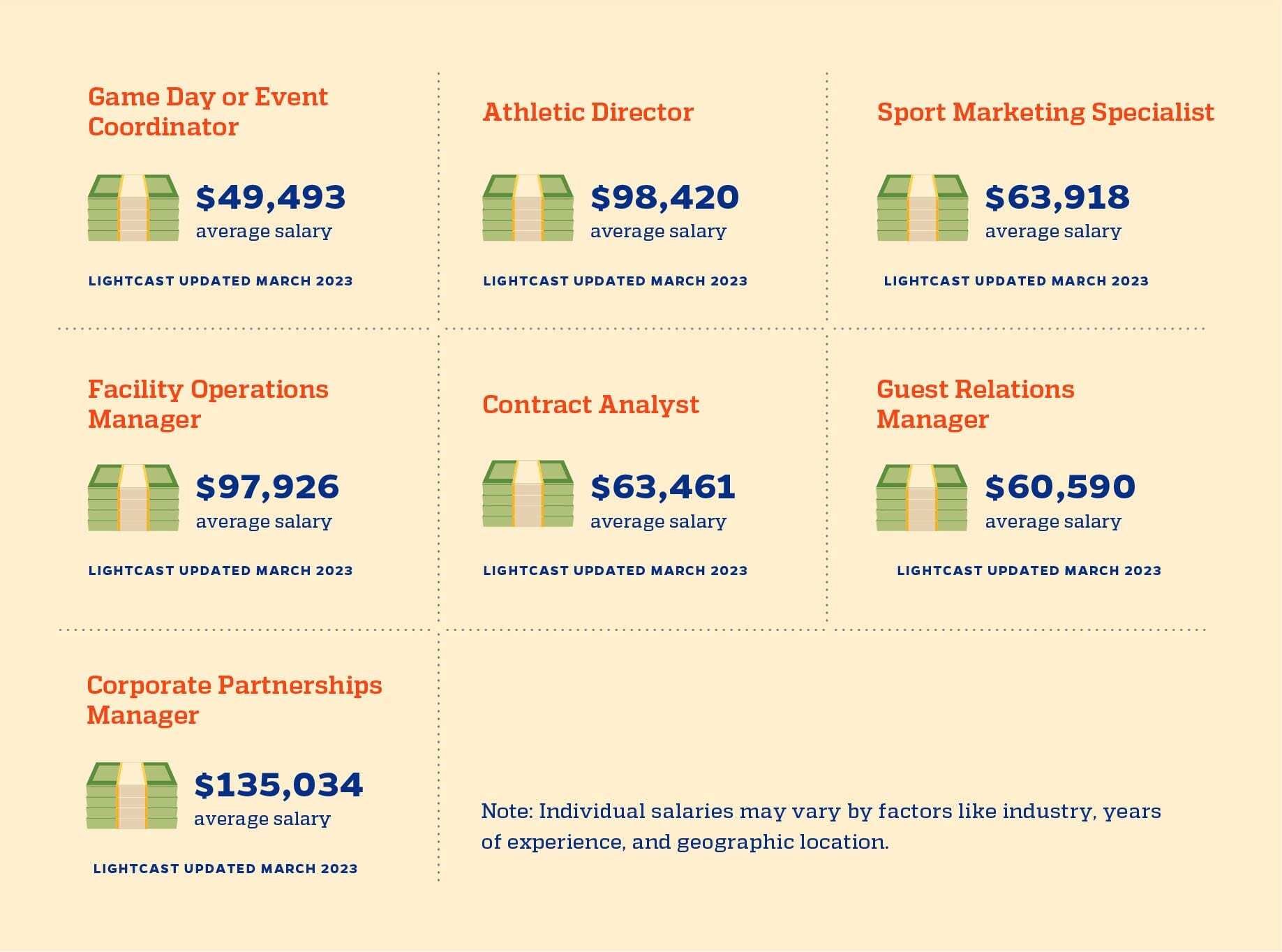Looking for opportunities in sports business jobs? You’re in the right place. Dive into a dynamic industry where passion meets strategy. From marketing to management, the realm of sports business jobs offers a playground for ambitious professionals. Whether you’re a sports enthusiast or a business guru, this field presents a plethora of roles waiting to be filled. So, let’s explore the exciting world of sports business jobs together!
Sports Business Jobs: A Comprehensive Guide to Thriving in the Industry
Embarking on a career in sports business can be an exciting and rewarding journey for individuals passionate about sports and business alike. The sports industry is a dynamic and ever-evolving field that offers a wide range of opportunities for professionals with diverse skill sets. From marketing and sales to analytics and operations, there are numerous avenues to explore within the realm of sports business jobs. In this detailed guide, we will delve into the various aspects of sports business careers, highlighting key roles, skills required, and tips for success in this competitive industry.
Exploring the Landscape of Sports Business Jobs
The world of sports business encompasses a wide array of roles that are vital to the success of sports organizations, teams, and leagues. These roles span across different functional areas, including marketing, finance, operations, sales, analytics, and more. Here are some of the most sought-after sports business jobs:
1. Sports Marketing Manager
Sports marketing managers are responsible for promoting sports teams, events, or organizations to drive fan engagement, increase ticket sales, and enhance brand visibility. They develop marketing campaigns, manage sponsorships, and engage with fans through various channels such as social media, email marketing, and partnerships.
2. Sports Sales Representative
Sports sales representatives focus on generating revenue through the sale of tickets, sponsorships, merchandise, and corporate partnerships. They build relationships with clients, negotiate deals, and create customized sales packages to meet the needs of businesses and individuals interested in sports-related opportunities.
3. Sports Business Analyst
Sports business analysts leverage data and analytics to provide insights into the performance of sports teams, events, or marketing campaigns. They analyze trends, forecast revenues, and identify opportunities for growth and optimization within the sports business ecosystem.
4. Sports Operations Manager
Sports operations managers oversee the day-to-day operations of sports organizations, ensuring smooth logistical coordination for events, games, and team activities. They manage facilities, logistics, scheduling, and staffing to ensure seamless operations and exceptional fan experiences.
5. Sports Finance Director
Sports finance directors are responsible for managing the financial health of sports organizations, overseeing budgeting, forecasting, and financial reporting processes. They work closely with stakeholders to make strategic financial decisions and ensure the long-term sustainability of the organization.
Skills and Qualifications for Success in Sports Business Jobs
Succeeding in sports business jobs requires a unique blend of skills, qualifications, and experiences that are tailored to the specific demands of the industry. Here are some key skills and qualifications that can help professionals excel in sports business careers:
1. Strong Communication Skills
Effective communication is essential in sports business jobs, as professionals need to interact with a wide range of stakeholders, including fans, sponsors, clients, and colleagues. Strong verbal and written communication skills are crucial for building relationships, negotiating deals, and conveying key messages effectively.
2. Marketing and Branding Expertise
A deep understanding of marketing principles, branding strategies, and digital marketing tactics is valuable in sports business roles that involve promoting teams, events, or products. Proficiency in social media marketing, content creation, and brand development can set professionals apart in the competitive sports industry.
3. Data Analysis and Research Skills
Sports business analysts need to have strong analytical skills and a keen eye for detail to interpret data, identify trends, and make data-driven recommendations. Proficiency in data analysis tools, statistical modeling, and research methodologies is essential for deriving valuable insights from complex datasets.
4. Financial Acumen and Budgeting Skills
In roles that involve financial management and budgeting, such as sports finance directors, professionals need to have a solid understanding of financial principles, budgeting processes, and financial reporting standards. Strong mathematical skills, attention to detail, and strategic financial planning are key attributes for success in finance-related sports business jobs.
5. Leadership and Team Management Abilities
Individuals aspiring to leadership roles in sports business should possess strong leadership skills, team management abilities, and a collaborative mindset. Effective leadership involves inspiring and motivating team members, setting strategic goals, and navigating complex organizational dynamics to drive success and innovation.
Navigating the Competitive Landscape of Sports Business Careers
The sports business industry is highly competitive, with a limited number of job opportunities available compared to the number of aspiring professionals seeking to enter the field. To thrive in this competitive landscape, individuals pursuing sports business careers can take proactive steps to enhance their skills, expand their networks, and differentiate themselves from the competition. Here are some tips for navigating the competitive landscape of sports business careers:
1. Gain Relevant Experience through Internships and Volunteer Opportunities
Internships and volunteer opportunities in sports organizations, agencies, or events can provide valuable hands-on experience and insight into the inner workings of the sports business industry. Seek out opportunities to intern or volunteer in roles that align with your career goals to build practical skills and establish industry connections.
2. Develop a Strong Professional Network within the Sports Industry
Networking is crucial in the sports business industry, as it can open doors to job opportunities, mentorship, and collaborations with industry professionals. Attend industry events, conferences, and networking mixers to connect with like-minded individuals, exchange ideas, and stay informed about industry trends and opportunities.
3. Stay Current with Trends and Innovations in Sports Business
To stand out in the competitive landscape of sports business careers, professionals should stay abreast of emerging trends, technologies, and innovations shaping the industry. Subscribe to industry publications, follow key influencers on social media, and engage in continuous learning and professional development to stay ahead of the curve and adapt to changing market dynamics.
4. Leverage Digital Platforms and Personal Branding to Showcase Expertise
Building a strong personal brand and cultivating a professional online presence can enhance visibility and credibility within the sports business industry. Create a professional website or blog to showcase your expertise, share industry insights, and position yourself as a thought leader in your area of specialization. Engage with industry discussions on social media platforms and contribute value-added content to establish your credibility and expand your professional network.
5. Pursue Continuous Learning and Skill Development Opportunities
In a fast-paced and dynamic industry like sports business, continuous learning and skill development are essential for professional growth and adaptability. Pursue relevant certifications, attend workshops, and enroll in online courses to enhance your skills, expand your knowledge base, and stay competitive in the evolving landscape of sports business careers.
In conclusion, sports business jobs offer a diverse and exciting array of opportunities for individuals passionate about the intersection of sports and business. By developing key skills, gaining relevant experience, and staying proactive in networking and professional development, aspiring sports business professionals can position themselves for success in this competitive industry. Whether you aspire to work in sports marketing, sales, analytics, operations, or finance, the sports business industry presents a dynamic and rewarding career path for those willing to embrace its challenges and opportunities. Embrace your passion for sports and business, and embark on a fulfilling journey in the world of sports business careers.
What Jobs Can I Get with a Degree in Sports Management?
Frequently Asked Questions
What are some common sports business job roles?
In the sports business industry, common job roles include sports marketer, sponsorship coordinator, sports event coordinator, sports facility manager, and sports public relations specialist.
What skills are important for a career in sports business?
Important skills for a career in sports business include strong communication skills, marketing skills, negotiation skills, budgeting and financial skills, event management skills, and knowledge of sports industry trends.
How can I break into the sports business industry?
To break into the sports business industry, consider gaining relevant experience through internships, networking with professionals in the field, pursuing a degree in sports management or related field, and staying updated on industry news and trends.
What are some key factors employers look for when hiring for sports business roles?
Employers in the sports business industry typically look for candidates with a passion for sports, relevant education or experience, strong teamwork and leadership skills, ability to work in a fast-paced environment, and a good understanding of marketing and business principles.
Is a degree in sports management necessary for a career in sports business?
While a degree in sports management can be beneficial for a career in sports business, it is not always necessary. Relevant experience, skills, and a passion for sports can also help you succeed in the industry.
Final Thoughts
In the competitive world of sports business, a wide range of exciting career opportunities awaits those passionate about the industry. From marketing and sponsorship to analytics and event management, sports business jobs offer dynamic roles for driven professionals. With a combination of business acumen and a love for sports, individuals can thrive in roles that merge their interests. Pursuing sports business jobs can lead to a fulfilling and rewarding career path, where one can contribute to the success of their favorite teams and athletes. Whether it’s managing partnerships or driving revenue growth, the world of sports business is brimming with potential for those eager to make their mark.






